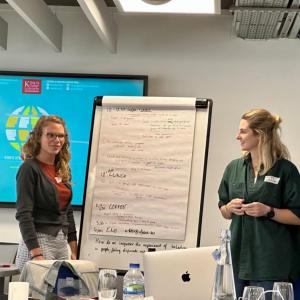You are here
Knowledge Mobilisation: Bridging the Gap Between Research and Policy
15 September, 2023

Translating the findings from our research into something that has a direct impact on policy or practice is a major goal for our unit.
Supporting us on this is Dr Harriet Boulding, a senior research fellow at the King’s Policy Institute. In June 2023, Harriet led a workshop training researchers from the HPRU in the art of knowledge mobilisation. This workshop wasn't just about exploring the challenges and complexities: it was about mastering the art of translating research findings into policy and practice.
Several key points came out of the day.
Decoding Knowledge Mobilisation
Knowledge mobilisation, as defined by the NIHR, involves the sharing of knowledge among different communities to incite change, particularly in policy and practice. This process goes by various names, including knowledge transfer, knowledge brokerage, research impact, knowledge exchange, and more. But these labels all converge on the pursuit of turning research into practical outcomes.
Acknowledging the complexity of the topic, Harriet emphasised that while not "rocket science," knowledge mobilisation requires skills (e.g., science communication and public engagement) that might not always be readily accessible within conventional research systems. Researchers need to understand the needs of policy makers. While success in knowledge mobilisation can never be guaranteed, maintaining an optimistic outlook is important.
The Multifaceted Nature of Policy
Policy reflects and shapes societies, and takes different forms. During the event, we learned about the multifaceted nature of policy as a series of ideas, courses of action, or methods selected by governments, institutions, groups, or individuals to guide decision-making processes.
This range highlights the importance of adapting knowledge to fit broader contextual needs. Researchers often emphasise 'scientific' evidence, empirical proof, and theoretical foundations. At the same time, policymakers often value anything that seems reasonable, policy-relevant, and timely.
We learned about the importance of bridging the gap between research and policy through a synthesis of these distinct viewpoints. We also explored 'localising' knowledge into policymakers' language and context, acknowledging linguistic and cultural barriers. We studied impactful cases where the application of research in emergencies has had practical implications for effective knowledge mobilisation.
Transitioning from Academia to Policy
We also explored the importance of infusing impact into research design. By understanding the rules and how things are done, including the people who use it, figuring out what's stopping change, and using middlemen to explain and promote their research, researchers can make their work more likely to have a big effect.
Tools like PESTLE analysis, SWOT analysis, and Policy Labs were introduced to help us navigate the policy-making terrain strategically. These tools help researchers to understand the external landscape, evaluate opportunities and threats, and effectively convey their findings.
The concept of Policy Labs took centre stage. We learned how these collaborative workshops bring together stakeholders to assess evidence, pinpoint barriers, and develop innovative approaches for improved outcomes. Through such interactive processes, researchers become direct contributors to policy-making discourse. During the workshop, we designed a policy lab. Each group brought unique perspectives, experiences, and expertise, resulting in great discussions and creative problem-solving. Attendees experienced the synergy of diverse minds united in pursuing a common goal and drafting an agenda for a stakeholder consultation.
Conclusion
The Knowledge Mobilisation session showcased a range of techniques for translating research into policy and practice. Attendees emerged as empowered agents of change, armed with techniques to understand societal needs, harness research for positive transformation, and acknowledging the value of effective communication and strategic collaboration. Researchers were primed to delve further, weaving themselves into the rich tapestry of public health advancement through the art of knowledge mobilisation.
By: Navsheen Kaur




